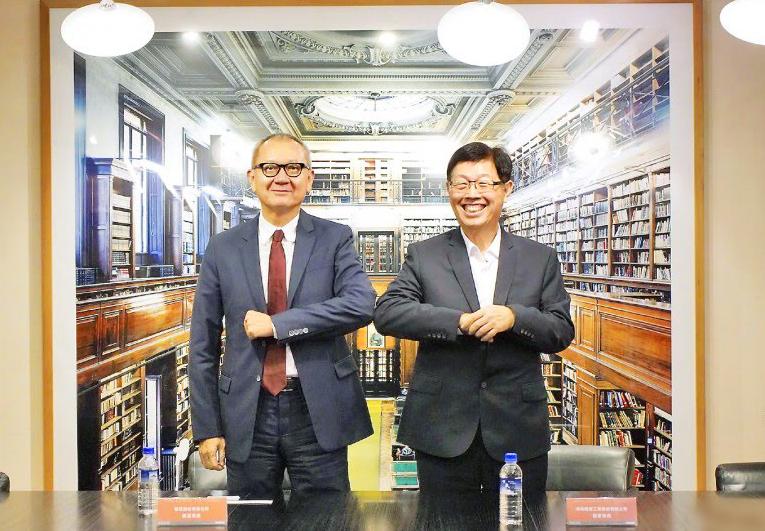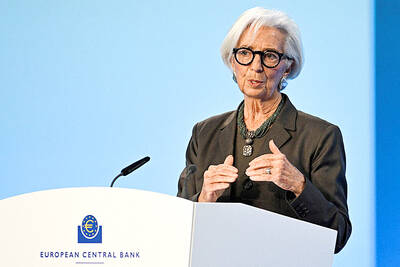Hon Hai Precision Industry Co (鴻海精密) and Yageo Corp (國巨) yesterday said that they plan to acquire a 30 percent stake in local semiconductor manufacturer Advanced Power Electronics Corp (APEC, 富鼎) for about NT$2.89 billion (US$97.45 million) through a joint venture, their latest effort to broaden their semiconductor portfolios.
The joint venture, XSemi Corp (國創半導體), has offered to buy 35 million Advanced Power Electronics shares at NT$82.58 per share, statements filed by the companies to the Taiwan Stock Exchange showed.
That represented a discount of 26.68 percent compared with Advanced Power Electronics’ closing price of NT$112.5 yesterday.

Photo: Fang Wei-chieh, Taipei Times
Advanced Power Electronics is one of the nation’s biggest makers of metal-oxide semiconductor field-effect transistors (MOSFET), a device that is widely used for switching and to amplify electronic signals.
The company has developed a comprehensive product lineup with more than 1,000 MOSFET products on offer, it said.
Hsinchu-based XSemi is a chip designer that specializes in analogue and power semiconductors primarily used in automotive and industrial devices.
The collaboration would help XSemi expedite its business development process, and improve its product portfolio and customer reach, especially with more business opportunities emerging, such as electric vehicles, digital healthcare and robotics, the statement said.
“APEC’s products will also complement highly with XSemi’s internally developed power management ICs, silicon carbide chips and modules as total solutions to provide to Hon Hai and Yageo’s existing and future customers,” the statement said.
Hon Hai is a major iPhone assembler, while Yageo is the world’s No. 3 supplier of passive components.
“Semiconductors have been one of the three key technology pillars of Hon Hai,” said Hon Hai chairman Young Liu (劉揚偉), who is also chairman of XSemi.
“On top of XSemi’s participation through its analogue and power products on the auto collaborations, its power module has also shown great progress,” Liu said in the statement. “With the private placement of APEC, XSemi will be able to fill the gap in its low to high-voltage silicon MOSFET product line, and this will provide steady semiconductor supply for the two groups’ future strategic focus in industrial and automotive.”
Hon Hai said it has injected an additional NT$1.599 billion in XSemi by subscribing to new shares issued by the semiconductor company, boosting Hon Hai’s stake to 51 percent.
Yageo would hold a 49 percent stake of the joint venture with new investments of NT$1.5 billion through its subsidiaries.
“Our alliance with APEC is to capture the upcoming opportunities in analogue and power semiconductors,” Yageo chairman Pierre Chen (陳泰銘) said in the statement. “Once the products are ready, we believe that we can quickly deliver them to the customers through Yageo’s extensive global channels.”

European Central Bank (ECB) President Christine Lagarde is expected to step down from her role before her eight-year term ends in October next year, the Financial Times reported. Lagarde wants to leave before the French presidential election in April next year, which would allow French President Emmanuel Macron and German Chancellor Friedrich Merz to find her replacement together, the report said, citing an unidentified person familiar with her thoughts on the matter. It is not clear yet when she might exit, the report said. “President Lagarde is totally focused on her mission and has not taken any decision regarding the end of

French President Emmanuel Macron told a global artificial intelligence (AI) summit in India yesterday he was determined to ensure safe oversight of the fast-evolving technology. The EU has led the way for global regulation with its Artificial Intelligence Act, which was adopted in 2024 and is coming into force in phases. “We are determined to continue to shape the rules of the game... with our allies such as India,” Macron said in New Delhi. “Europe is not blindly focused on regulation — Europe is a space for innovation and investment, but it is a safe space.” The AI Impact Summit is the fourth

CONFUSION: Taiwan, Japan and other big exporters are cautiously monitoring the situation, while analysts said more Trump responses ate likely after his loss in court US trading partners in Asia started weighing fresh uncertainties yesterday after President Donald Trump vowed to impose a new tariff on imports, hours after the Supreme Court struck down many of the sweeping levies he used to launch a global trade war. The court’s ruling invalidated a number of tariffs that the Trump administration had imposed on Asian export powerhouses from China and South Korea to Japan and Taiwan, the world’s largest chip maker and a key player in tech supply chains. Within hours, Trump said he would impose a new 10 percent duty on US imports from all countries starting on

STRATEGIC ALLIANCE: The initiative is aimed at protecting semiconductor supply chain resilience to reduce dependence on China-dominated manufacturing hubs India yesterday joined a US-led initiative to strengthen technology cooperation among strategic allies in a move that underscores the nations’ warming ties after a brief strain over New Delhi’s unabated purchase of discounted Russian oil. The decision aligns India closely with Washington’s efforts to build secure supply chains for semiconductors, advanced manufacturing and critical technologies at a time when geopolitical competition with China is intensifying. It also signals a reset in relations following friction over energy trade and tariffs. Nations that have joined the Pax Silica framework include Japan, South Korea, the UK and Israel. “Pax Silica will be a group of nations